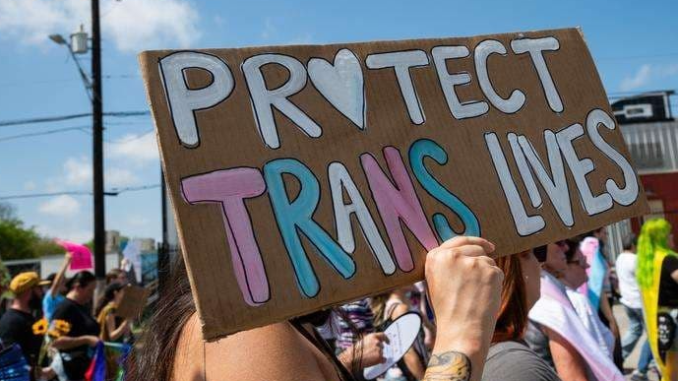
More than 300 activists and supporters marched from the Bexar County Courthouse to Crockett Park in “March for Us,” at the third annual celebration of Transgender Day of Visibility, on March 29, 2025, in San Antonio. Credit: Salgu Wissmath for The Texas TribunePhoto by: Salgu Wissmath for The Texas Tribune
Dozens of trans people and their allies gathered in the outdoor Capitol rotunda Friday, chanting at the top of their lungs.
They will not erase us.
The next day, the Texas House of Representatives preliminarily passed a bill that aims to do just that.
{snip}
The bill passed on second reading 86-36 after an at times tense debate, and is expected to be finally approved next week before going to the Senate, which has already passed several bills with a similar focus.
Surrounded by a cadre of Republican women, Troxclair said the goal of the bill was to ensure women’s rights aren’t “eroded by activists” as more people come out as trans and nonbinary. Democrats argued against the bill for almost three hours with Rep. Jessica González, D-Dallas, saying “it is harmful, it is dangerous, and it is really freaking insulting.”
{snip}
Saturday’s debate rehashed a deep fracture over sex and gender that has animated the Texas Legislature, and much of the country, for the last five sessions. In previous years, legislators focused on tangible questions of bathroom access, youth sports and gender-affirming care for minors.
This year, the proposals that have gained the most traction reflect a more fundamental question: what is a woman?
{snip}
Only one of those groups controls the Texas Capitol.
“We’re a state that believes in truth, and we’re a state that honors the hard-won achievements of women, the women who fought for the right to vote, to compete in sports and to be safe in public spaces, to be treated equally under the law,” Troxclair said on the floor. “But if we can no longer define what a woman is, we cannot defend what women have won. We cannot protect what we cannot define.”
In the bill, a woman is defined as “an individual whose biological reproductive system is developed to produce ova,” and a man is “an individual whose biological reproductive system is developed to fertilize the ova of a female.” Democrats criticized this as overly simplistic, excluding trans people, but also intersex people and those who can’t conceive children.
{snip}
This bill aligns with an executive order from Gov. Greg Abbott, who declared in January that Texas only recognizes two sexes, male and female, and a non-binding legal opinion from Attorney General Ken Paxton, who said state agencies should not honor court opinions to change someone’s sex listed on official documents.
At the Capitol rally on Friday, Lambda Legal senior attorney Shelly Skeen said revoking these changed documents, and preventing people from changing them in the future, “affects every aspect of our daily lives.” Having a birth certificate or drivers’ license that reflects a different sex than their physical presentation, or that doesn’t align with their passport or other documents, could leave trans people in a legal limbo and potentially open them up to violence, she said.
{snip}
Troxclair did accept one amendment, by El Paso Democrat Rep. Mary González, to clarify how intersex people, who are born with both sets of reproductive organs, fit into these definitions.
The chamber also preliminarily approved Senate Bill 1257, which would require health insurers that cover gender-affirming care also cover any adverse consequences and costs of detransitioning. The bill, authored by Sen. Bryan Hughes and sponsored by Rep. Jeff Leach, passed 82-37.
Leach said he brought this bill on behalf of people who were left with tens and hundreds of thousands of dollars of medical bills because their health insurance wouldn’t cover the costs of detransitioning.
{snip}
The bill says that any insurance company that covers gender-affirming care must cover all detransition-related costs for its members, even if that person wasn’t on the health insurance plan at the time they transitioned. Democrats filed more than half a dozen amendments to narrow the scope of the bill, critiquing the bill as a health insurance mandate. None of the amendments passed.
Last session, Texas lawmakers outlawed gender-affirming care for minors. Trans advocates worry that raising the cost of covering gender-affirming care will result in health insurers not covering the treatments for adults, either.
{snip}
Speaking on the floor Saturday, Rep. Ann Johnson, a Houston Democrat, said the Legislature was telling insurance companies not to cover gender-affirming care.
“The reality is this bill, however you couch it, is about eliminating the existence of trans individuals in Texas,” Johnson said. “Stop pretending that you’re for freedom. Stop pretending that this is about the kids.”
* Original Article:
https://www.texastribune.org/2025/05/10/texas-house-trans-bills-advance/